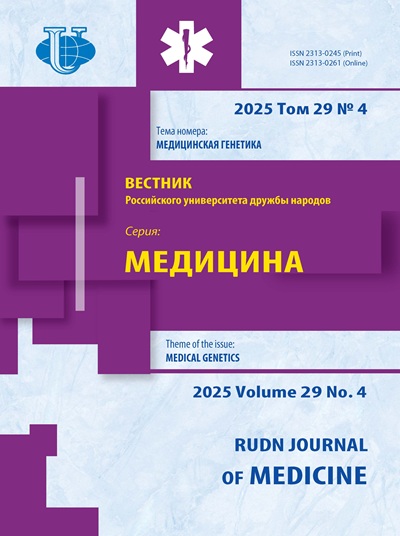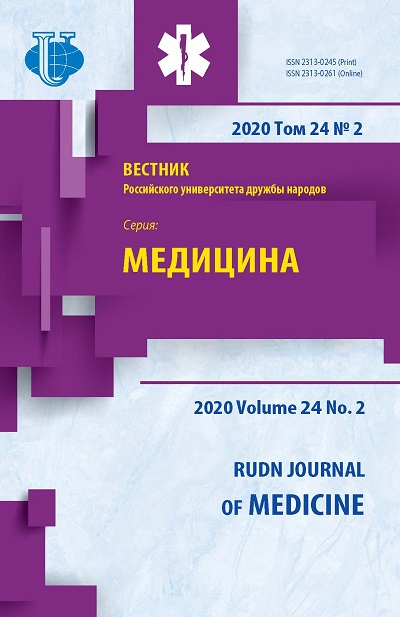Immunohistochemical study of P53 protein expression in different prostate cancer Gleason grading groups
- Authors: Kudryavtsev G.Y.1,2, Kudryavtseva L.V.1, Mikhaleva L.M.3, Kudryavtseva Y.Y.1, Solovyeva N.A.1, Osipov V.A.1,2, Babichenko I.I.1
-
Affiliations:
- Peoples’ Friendship University of Russia (RUDN University)
- War Veteran Hospital № 2
- Research Institute of Human Morphology Moscow
- Issue: Vol 24, No 2 (2020)
- Pages: 145-155
- Section: ONCOLOGY
- URL: https://journals.rudn.ru/medicine/article/view/23810
- DOI: https://doi.org/10.22363/2313-0245-2020-24-2-145-155
- ID: 23810
Cite item
Full Text
Abstract
Prostate cancer (PC) remains an urgent public health problem, especially in developed countries. The use of immunohistochemical research methods in addition to the morphological classification of prostate adenocarcinomas allows a more accurate diagnosis and prognosis of the disease. The aim of the study is to identify isoforms of P53 using clones of mouse antibodies (D-07 and Y5; Epitomics, USA) in prostate cancer with different proliferative activity and the degree of malignancy. Materials and Methods: The work included surgical material for prostate resection and prostatectomy, as well as biopsy specimens (56 cases in total). An immunohistochemical study was carried out with the Ki-67 marker, as well as with mouse monoclonal antibodies (D-07 and Y5) to the P53 protein, interacting with its “wild” and mutant isoforms. The significance of the difference in the samples was determined using the Mann-Whitney U-test, correlation relationships were determined using the Spearman coefficient. Results: Expression of P53 upon interaction with antibodies D-07 and Y5 was determined in 56.3% and 39.6%, respectively. A statistically significant direct correlation was found between the severity of P53 expression when interacting with Y5 antibodies and the degree of tumor differentiation (rs = 0.567, p <0.05), as well as between the expression level of this protein and tumor proliferative activity (rs = 0.698, p <0.05). Conclusion: Antibodies of clone D-07, interacting with both wild and mutant isoforms of P53 protein, show positive expression in adenocarcinomas of all degrees. Expression of the mutant P53 protein is most pronounced in low-differentiated carcinomas and correlates with high proliferative activity of tumor cells, which may be associated with a loss in the induction of P53-dependent apoptosis.
Keywords
About the authors
G. Y. Kudryavtsev
Peoples’ Friendship University of Russia (RUDN University); War Veteran Hospital № 2
Author for correspondence.
Email: kgosha@mail.ru
Moscow, Russian Federation
L. V. Kudryavtseva
Peoples’ Friendship University of Russia (RUDN University)
Email: kgosha@mail.ru
Moscow, Russian Federation
L. M. Mikhaleva
Research Institute of Human Morphology Moscow
Email: kgosha@mail.ru
Moscow, Russian Federation
Y. Y. Kudryavtseva
Peoples’ Friendship University of Russia (RUDN University)
Email: kgosha@mail.ru
Moscow, Russian Federation
N. A. Solovyeva
Peoples’ Friendship University of Russia (RUDN University)
Email: kgosha@mail.ru
Moscow, Russian Federation
V. A. Osipov
Peoples’ Friendship University of Russia (RUDN University); War Veteran Hospital № 2
Email: kgosha@mail.ru
Moscow, Russian Federation
I. I. Babichenko
Peoples’ Friendship University of Russia (RUDN University)
Email: kgosha@mail.ru
Moscow, Russian Federation
References
- Bray F, Ferlay J, Soerjomataram I, Siegel RL, Torre LA. Jemal. A Global cancer statistics 2018: GLOBOCAN estimates of incidence and mortality worldwide for 36 cancers in 185 countries. Cancer J Clin. 2018;68:394–424.
- Ferlay J EM, Lam F, Colombet M, Mery L, Piñeros M, Znaor A, Soerjomataram I, Bray F. Global Cancer Observatory: Cancer Today. Lyon, France: International Agency for Research on Cancer. Published 2018. Accessed 14 September, 2018.
- Kaprin A.D., Starinskij V.V., Petrova G.V., redaktory. Zlokachestvennye novoobrazovaniya v Rossii v 2018 godu (zabolevaemost’ i smertnost’). M.: MNIOI im. P.A. Gercena – filial FGBU «NMIC radiologii» Minzdrava Rossii, 2019. 250 p.
- Negoita S, Feuer EJ, Mariotto A, Cronin KA, Petkov VI, Hussey SK, et al. Annual Report to the Nation on the Status of Cancer, part II: Recent changes in prostate cancer trends and disease characteristics. Cancer. 2018;124(13):2801–14.
- Lu Y, Liu Y, Zeng J, He Y, Peng Q, Deng Y, et al. Association of p53 codon 72 polymorphism with prostate cancer: An update meta-analysis. Tumour Biol. 2014;35: 3997–4005.
- Kastenhuber ER, Lowe SW. Putting p53 in Context. Cell. 2017; 170(6):1062–78.
- Lozano G, Levine AJ, editors. The p53 Protein: From Cell Regulation to Cancer. Cold Spring Harbor, NY: Cold Spring Harb. Lab; 2016. 245 p.
- Valdez JM, Nichols KE, Kesserwan C. Li-Fraumeni syndrome: a paradigm for the understanding of hereditary cancer predisposition. British Journal of Haematology, 2016; 176(4), 539–52.
- Muller PA, Vousden KH. Mutant p53 in cancer: new functions and therapeutic opportunities. Cancer Cell. 2014;25(3):304–17.
- Kruiswijk F, Labuschagne CF, Vousden KH. p53 in survival, death and metabolic health: a lifeguard with a licence to kill. Nat Rev Mol Cell Biol. 2015;16:393–405.
- Missaoui N, Abdelkarim SB, Mokni M, Hmissa S. Prognostic factors of prostate cancer in Tunisian men: immunohistochemical study. Asian Pac J Cancer Prev. 2016;17:2655–62.
- Chevrier M, Bobbala D, Villalobos-Hernandez A, Khan MG, Ramanathan S, Saucier C, et al. Expression of SOCS1 and the downstream targets of its putative tumor suppressor functions in prostate cancer. BMC Cancer. 2017;17:157–61.
- Zellweger T, Gunther S, Zlobec I, Savic S, Sauter G, Moch H, et al. Tumour growth fraction measured by immunohistochemical staining of Ki67 is an independent prognostic factor in preoperative prostate biopsies with small-volume or low-grade prostate cancer. Int J Cancer. 2009;124:2116–23.
- Kaur H, Paul M, Manjari M, Sharma S, Bhasin TS, Mannan R. Ki-67 and p53 immunohistochemical expression in prostate carcinoma: An experience from a tertiary care centre of North India. Annals of Path and Lab Med. 2016;3(6):509–16.
- Fantony JJ, Howard LE, Csizmadi I, et al. Is Ki67 prognostic for aggressive prostate cancer? A multicenter real-world study. Biomark Med. 2018;12(7):727–36.
- Berlin A, Castro-Mesta JF, Rodriguez-Romo L, Hernandez-Barajas D, González-Guerrero J F, Rodríguez-Fernández IA. Prognostic role of Ki-67 score in localized prostate cancer: A systematic review and meta-analysis. Ur Onco. 2017; 35(8): 499–506.
- Kudryavtsev GY, Kudryavtseva LV, Mikhaleva LM, Babichenko II. Immunohistochemical Study of Tumor Cells Proliferative Activity at Different Graduations. RUDN Journal of Medicine. 2019 Dec; 23 (4): 364–72.
- Verma R, Gupta V, Singh J, et al. Significance of p53 and Ki-67 expression in prostate cancer. Urol Ann. 2015;7(4):488–93.
Supplementary files















